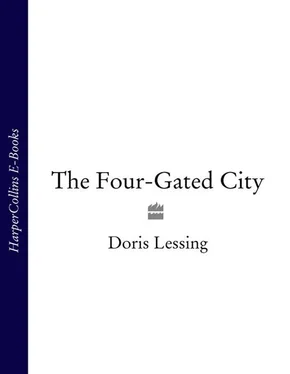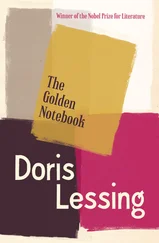Now Mark came into the room in his dressing-gown. He seemed annoyed: he had been disturbed by Sally-Sarah? He looked at the note on the table: eggs, butter, tap. He was helplessly annoyed.
‘I’ll have coffee,’ he said. ‘No, I’ll make it.’
Martha handed him his son’s note. When he had read it she said: ‘I’ll stay for Christmas. But I must go afterwards.’ They looked at each other.
‘It would be good of you to stay,’ he said, appealing, and hating himself for it.
‘No. I want to. But, Mark, after Christmas I’ve got to go.’ ‘Of course. You are absolutely right. Absolutely.’
Six weeks later, on a bitter day, Martha was dressed in layers of sweaters, clearing and arranging the basement. This was for the housekeeper that Mark had at last agreed he should have. The business of the basement had been going on since Christmas, a groundbass to so many apparently pre-eminent themes, apparently a minor thing, an annoyance, a question of organization merely. In fact she could see now that it had been the most important, it was the one theme that had possibilities of development, of movement: a growing point in this stagnant mess. Before Christmas she had gone to Mark’s study, late, braving his reluctance ever to be confronted, and pointed out that a housekeeper would give him all the advantages of a Martha, and none of the disadvantages. He did not want to see it. He liked her, he said: how was he to know he would like this housekeeper? – He wouldn’t until he had engaged her!
He did not want a strange person! – Yes, but she, Martha, had been strange until she arrived.
Where was she to live, this housekeeper? – Why, where Martha lived of course, why not?
Yes, but – There was the basement, why not use that? It was simply a question of …
Yes, yes, yes, he muttered, he would. But first he must just …
He had been unable to stand any more. Martha could see that, and went down to survey the basement. It had been used as an overflow depot for years, both from upstairs, and from the house in the country, when that was sold. It was stacked with furniture, carpets, pictures. Some of it had to be sold; Mark could not bear, he said, to see the furniture of his childhood carted off to salerooms; but there was no help for it. He came briefly down, indicated the pieces that were valuable and should be kept, and for the rest, a dealer had come and taken things away. And now Martha was to arrange the place as she pleased, since they were not to know the taste of the future housekeeper, who would be getting a luxury flat when she came. The walls had been done for damp; cupboards had been put in; a bathroom and a kitchen were ready – almost, since although they were employing a firm which charged high prices for efficiency, it was impossible to get anything done well. Meanwhile, since workmen were in, workmen might as well attend to the rest of the house. As Martha was leaving, had actually put down a deposit on a flat, she felt free to take the house in hand. It was in a dreadful state beneath its surface of order. If it hadn’t been built to stand attrition, it would have been a slum. Mark having done no more than engage in a holding operation (his phrase) since Lynda’s illness. Workmen dug everywhere into floors and walls and filled the place with the smell of new colour. The roof was mended – or would be, these things took time. Carpets and curtains were cleaned – patience, there had been a war on.
Martha dealt with men and their employers, while the people whose home this was were clutched in such fearful anxiety, and it seemed to her that yet again she had walked on to that stage where two or three different types of plays were running together, for it did not seem possible that such discordant events could be sharing a texture of time or place, except in a dream-like capacity to change into something else, like the flamingoes into croquet sticks. Margaret, for instance, took to storming in, rather regally, in order to drop well-chosen words about if-a-thing’s-worth-doing-at-all-it-is-worth-doing-well, like a white housewife to her black ‘boy’, while the workman so addressed would put on that act of a humble yet self-respecting servant deferring to his better. Then Margaret would depart. Martha was a foreigner, and not a member of the British ruling classes, and besides she knew one of the useful languages, the dialect of trades unionism, and therefore the workmen did not bother to put a show on for her. Not one of them was prepared to do a minute’s more work than he had to, or do it better than he could get away with, for the most basic of reasons; he would get nothing out of it if he did, while the people who employed him were interested only in making money, which it was their business to do. And besides there had been a war on. There wasn’t one job these men did that wouldn’t have to be done again and very soon, so badly was it done and so poor the materials. There were frightful, but good-natured battles of wills, since both sides knew the limits of such battles, and Martha cajoled and argued and bargained and made small gains. Meanwhile newspapers flooded into the house which trumpeted the destruction of Britain by socialism (internal, the Labour Party) and by communism (external), as manifested by people like Colin Coldridge’s colleague, working for Russia.
Meanwhile, Mark spending his days for the most part with his brother, or in his factory, since he could not endure to see his home under attack, spent his nights talking to Martha in his study, mostly about his childhood and about Lynda. He was not a person who found it easy to talk, she discovered; but it had been easier since Christmas, which had laid so much open.
Christmas had been dreadful. First, Lynda, allowed home by her doctors on condition she was returned to them the moment she showed signs of strain. Then, Francis home from his school – to spend Christmas with his father and mother. So he had been told by his house-master. ‘I’d like that,’ he said, or quoted, cautiously, in his way of testing out phrases, words, used by others about his situation. ‘I must be careful,’ he went on, his wide painful eyes fixed on Martha’s face so that she could confirm or deny: ‘My mother isn’t very well, you see. I mustn’t upset her.’
An awful school. A couple of hundred little boys, guarded by men. ‘The little ones’ (Francis’s description of the boys younger than himself) had a matron, but ‘the big ones’ had men. They all slept in dormitories, were made to play games, were bullied by those older than themselves, exactly as these institutions have been described, mostly by their victims, for decades. It all went on, as things do, out of the inertia of what is in existence. Francis wore a tight grey flannel suit, with a tie and a collar; he was obsessed with his shoe-laces, which were always getting themselves untied, and his brown wide eyes were always on the alert, for fear he might be doing something he should not.
Three days before Christmas Sally telephoned to ask if she could come with her child for the holiday, her husband being ‘impossible, Martha! He’s as stubborn as a horse. I’m not going to stay where I’m not wanted!’ His impossibility apparently, was that he would not talk to his wife about what preoccupied him. He was spending all his waking time with his superiors, being cross-examined about his possible links with international espionage, and his relationship with his friend and superior, now awaiting trial. The police were making visits too. He would not talk to his wife; but he came to London to talk to Mark. The brothers had spent all afternoon together; and then Martha joined them for dinner and the evening.
Colin announced almost immediately that he was ‘not a communist but a marxist’.
Martha kept sounding notes to which he could not help responding if – he were not trying to hide something? Not a man numbed by terror. How to account for this lack of resonance? Unless, of course, he was not a communist and never had been one. But she had not before met this type of person who, because he admires a certain communist country, or a communist achievement, or to annoy Aunt Authority, will call himself, herself, a communist or a marxist without ever going near the communist party. They are pretty common at times when the heat is off and to admire communism not dangerous – during the war, for instance, or during the later ‘fifties and the ‘sixties. But this kind of platonic admiration, at the height of the Cold War was quixotic or simply – crazy. Unless to be a Coldridge absolved one from the necessity for caution, which is what Martha was beginning to believe.
Читать дальше












